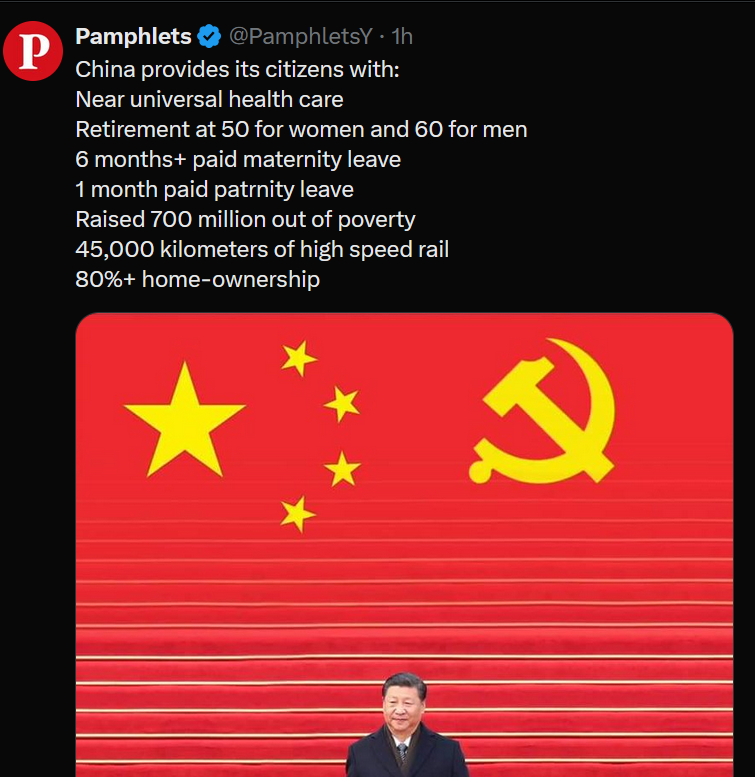
One theory I’ve heard about the accelerating of the worsening conditions of western proletariat is that the USSR used to provide a bulwark against things getting too bad. People would point at the USSR and the illusion that capitalism was better for individual prosperity would collapse in comparison. Then, with the USSR gone things have been deteriorating for the past ~30 years.
If that is true, even somewhat, why haven’t we seen a similar effect from China’s example? Is the theory simply wrong? Maybe western capitalism is just unable to even offer scraps from the table at this point. Maybe people are unaware of how things are in China? Could we dare to expect that China’s example will force a lifting of the boot from our necks?
Because there is no working class movement in the west. Concessions were the result of decades of fighting by several organized workers movements, they weren’t just granted willingly.
Obviously westerners are just not voting hard enough. If USians vote REALLY hard for the Democrats, this time it will work.
Do your ballot with feeling
Striking and unionizing is more powerful.
Thats literally how all these concessions were granted in the first place, they didn’t come from voting the “good” guys.
they don’t need to concede anything because the general public of western nations is still convinced china has 90% of their population in gulags and any wins they have is because of the gulags
i think that theory falls apart in modern times because of the severe ideological differences between then and now. socialism back then, even in the west, was regarded as legitimate and a viable alternative. now, in western countries, socialism is 100% tried and failed. it’s irredeemable, so any benefits other countries see from it are 100% because of the gulags.
Not just the general public, the average “”“leftist”“” has been convinced China a capitalist hellscape with all jobs being sweatshops and the like.
It’s always the same like three or four talking points too, every single time. They aren’t even particularly compelling ones.
It’s not like China is a perfect country that cannot be criticized whatsoever, but their arguments always boil down to “Oh yeah, social credit and winnie the pooh! TAKE THAT WUMAO”
only stupid dumdum brainwashed tankie baby-brained ccp pooh bear shills believe otherwise /s
With China becoming a holiday destination, with Visa free travel for several European states. Do you expect any effect at all in the future?
in near future, no. based on anecdotal evidence of interacting with west europeans, fear mongering about china has seeped to much, won’t shrug off anytime soon, specially with multiple crises and tensions rising in the world and the role china has on the global stage.
my guess is this effect will be seen in the global south, as china is delivering infrastructure and investments in africa and latin america.
Alongside the other points people have made- distance, Orientalism, racism, and the (heavily propagandized) notion that China is “just as capitalist”- and the fact that socialism and the left has been thoroughly demonized and rooted out in the west at this point- I think another factor is that the corruption, arrogance, and neoliberal financialization- in other words, the various contradictions of the western system- have set in too deep to be simply waved away as concessions, even in the most pathetic band-aids of measures.
That’s not to say we can be complacent- the contradictions have run their course before IMO, in the Great Depression and its impacts across the west (particularly the US and Weimar Germany) and we all know how that turned out. But IMO it will take a similar shock to make the west break out of its liberal (hell, worse than that- neoliberal) orthodoxy, what with all interests enforcing it to its fullest extent- and even then, the fascism button is always easier, more tolerable to capital, than even the slightest hint of concessions.
The ruling class was overly confident of their victory in the 90s over communism. They are high on their own supply to this day and think China will collapse any time now. Essentially, they don’t believe they need to give significant concessions because, in their view, there is no alternative, and workers have no choice other than capitalism. It’s not just our politicians who think there is no alternative, but many ordinary people as well.
Because the concessions occurred because the communists were at the gates. Socialism was seen as valid, popular, etc. They also hadn’t had decades to make propaganda and red scare counter narratives. In light of that and the fall of the Soviet Union plus different global circumstances (in the 50s there was still plenty of the global south subject to barely disguised open plunder profits from which were high enough that they felt they not only had to but could afford to buy off the working class of the imperial core).
I think there’s still this idea that China is poor to most people. Tell them that their quality of life is equal to Portugal and Westerners still shrug that off… because in their minds it’s still bicycles and dirt roads.
China needs to export Chinese soap operas or something.
The Office China, but have it be a worker controlled co-op or something
Is there a source for comparing China’s quality of life to that of Portugal? I would like to give that a read.
Cause there is a reason people like myself are leaving Portugal and it isn’t because of good quality of life.
I would say there are a couple aspects to that.
“Maybe people are unaware of how things are in China” This is one of them. People are largely oblivious to the success of China. Anytime something technologically advanced is shown from China, people lose their shit over the fact that it must be fake or it will collapse in a stiff breeze. How many people do you know that still think “Chinese products are cheap but poor quality”. I know it is something of a meme but if you show somebody a picture of something from China and tell them it is Japanese, they will lose their shit over it. Show them a picture of Japan and tell them it is China, and they will scream about it being a dystopian hellscape.
There is also the tendancy to attribute every success of China to capitalism, and every failure to socialism.
The west’s propaganda campaign against China has been ongoing in some form or another since the CPC came to be. It has become heightened in recent years, but it dates back a very long time.
Now the global south has a generally much more positive view of China already, whether that could trickle down into the West remains to be seen really.
There is also the tendancy to attribute every success of China to capitalism, and every failure to socialism.
This is a really important point. It’s been the go-to strategy to discredit Chinese socialism for at least the last two decades.
deleted by creator
It’s simply scientific! - Kwame Ture
deleted by creator
deleted by creator
is there a way to read this without a twitter account?
deleted by creator
deleted by creator
This may sound kind of silly, but part of me wonders if geography is a component here. China is a distant, exotic state in the far-east. There is a definite ignorance of what is actually happening in China, but that might be a consequence of general ignorance of China’s past. People know about eastern Europe and its history, so there’s a point of reference for how things changed under socialism. China might as well be the moon.
We always hear about how great and perfect and wholesome pre-socialist China was, with the peaceful monks and what not. Could the West really sell this lie about the Soviet Union?
Orientalism definitely plays a role
“Chinese aren’t human.”

There’s no concessions because there is no THREAT to capitalism.
Flying cars in China: “Breathe some of this!”

America’s version of a flying car is when it free falls into the water driving on a Baltimore bridge.
What about the CPC?
My theory in that is that the West is experiencing late stage capitalism: the majority of capital is sitting in finance and assets. China is just another destination that does allow capital to directly flow in, within certain rules.
For example, major international hotel chains are all in China. This is a form of property investment even though it does employ people who provide services. It is assessed as property by capitalists. While the Chinese property market is deflating, that just means capital may leave. That’s not a threat that requires any concessions to everyday Americans or Westerners.
I chuckle at the idea that capitalists can’t afford concessions. They can. They choose not to.
I think they mean in terms of ideological threats to capitalism in the imperial core
One of the reasons is that with the fall of the soviet block came the fall of the communists parties of the commintern, all the influential communist parties in europe and north america started to rot away so to speak, they became revisionists, were hijacked by feds, often abandoned the revolutionary path and repeatedly split into many lesser parties of ever declining influence.
The USSR was not only on the doorstep of the western world but also allied to the western communists movements and openly assumed this role of international beacon of socialism that China has never tried to take over, the USSR was promoting it’s model as an example of socialism that they advised worker movements to take inspiration from where as China never tried to be this role model for the world and keep to themselves a lot more.
There is also the fact that unlike the soviet union, a lot of peoples are arguing that China isn’t socialist and as such these peoples don’t see it as a model of socialism.
And of course, socialism is a lot more tangible when over a dozen countries are socialists vs only 5 right now. The fall of the socialist block was a hard blow to the movement worldwide as it was understood by most as a decisive victory of capitalism over socialism.
They discovered it’s cheaper to just lie about China
That def helps, but they lied about the USSR’s living standards too, so something makes this case different.
That’s a tough one. The PRC is just as, if not more demonized, than the USSR was, and imperial-core populations believe that China is a monarchist dictatorship with 90% of the population of China living in a gulag or in extreme poverty.
Some possible explanations:
- Western europe was a front-line during the cold war, and part of the ideological victory of Capitalism > Communism meant that it was important to spend resources on social welfare in western europe. That isn’t necessary now, because the front line(s) of this new cold war aren’t on the borders of imperial core countries (yet).
- Language barriers: not a lot of people in imperial core countries speak Mandarin, but in the first cold war, many countries with leftist movements had common languages: Spanish, Russian, German, etc. But right now, most of the world can stay ignorant of China’s success story, because its mainly told in Chinese. The PRC is trying to combat this via its news and education programs in English and other languages.
- The USSR and the US were in a tech and military arms race, and the many successes of the USSR’s state-run programs forced the US to adopt its models. Its why they established DARPA and state-funded a ton of tech in the 50s onward. Those state-run models worked well, and were emulated in the social welfare sectors too, until they were dismantled in the 1980s with the downfall of the USSR. The US has had administrations that tried to “pivot to china”, but it never really considered it a competitor in tech or welfare until recently.
- The PRC, unlike the USSR, made a conscious choice early on to not de-link from the world economy, but integrate into it. So the US completely ignored the PRC’s tech development, and was happy to export capital and technology from the 80s onward. US propaganda has only recently caught up to this, and only started demonizing China in the past decade or so. Even though their propaganda campaign was entirely successful (like 80% of the US and Canada hate China rn), you still see them trying to do things like “Build back better”, and other social revitalizing efforts, so they aren’t completely unaware of the threat of a good example.
If we look at the biggest neoliberal hellhole, the USA, things got worse there at the time of the Reagan presidency, which started in 1981. That’s actually when neoliberalism entered the vocabulary as a word. It was also around the time of Perestroika and other liberal reforms in the USSR.
But we have to remember that in the first years of Deng up until recently under Xi, China was seen as a flawed capitalist country. The West sincerely though this, and thought they could “improve” their democracy.
In that sense there was nothing to be inspired from. Our media saw China as just another capitalist hellhole, even worse than ours in fact. Their “sweatshops” – factories in which manual labor was performed (which is demeaning to the westerner) – were not something our proletariat wanted to emulate for themselves. We were very happy in fact to offload our production there because to the capitalist, it kept costs low and to the proletariat, it kept prices low.
I think the USSR shook things in the early days, in the days where there was a real risk of the revolution inspiring movements in the rest of Europe. After that, it was mostly business as usual.
My grandparents, who worked in the mid-century, did not have conditions as good as we have them today – for the most part. So I don’t think it’s universal or so uncontested (although I still like using the argument because it makes non-communists think about their conditions) that the USSR is what gave us labor rights. At least, like I said, after the early years of the revolution.
Definitely though the Marshall Plan was the perfect opportunity to not give the Soviets any popularity points in Europe, but the implications of it went further than just preventing communism. It also cemented the USA as the imperial hegemon (I guess that’s also part of trying to prevent communism if you wanna look at it that way). But by then Europe already had healthcare and some other social programs, most countries got those before the war.




















